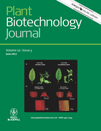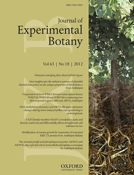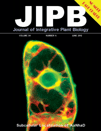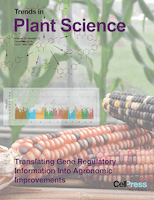
PLANT BIOTECHNOLOGY JOURNAL
metrics 2024
Advancing sustainable solutions through plant innovation.
Introduction
Plant Biotechnology Journal, published by Wiley, is a premier open-access platform dedicated to advancing the field of plant biotechnology. Since its inception in 2003, this journal has played a pivotal role in disseminating high-quality research that enhances our understanding of plant genomics, biochemistry, and molecular biology. With an impressive impact factor and a prominent position in Q1 quartiles across Agronomy, Crop Science, Biotechnology, and Plant Science, it ranks among the top journals globally, reflecting its significant influence in the agricultural and biological sciences. Researchers and professionals can access cutting-edge studies and reviews that facilitate innovation in sustainable crop production and biotechnology applications. The journal's transition to an open access model since 2016 has further amplified its reach, ensuring that vital research is available to a global audience, promoting collaboration and knowledge sharing within the scientific community.
Metrics 2024
 3.00
3.00 10.10
10.10 11.60
11.60 152
152Metrics History
Rank 2024
Scopus
IF (Web Of Science)
JCI (Web Of Science)
Quartile History
Similar Journals

Annual Plant Reviews Online
Shaping the Future of Sustainable AgricultureAnnual Plant Reviews Online, published by WILEY, serves as a premier academic resource dedicated to the evolving field of plant sciences, including specialties in agronomy, horticulture, and food science. With an impressive Q1 ranking in Horticulture and Q2 classifications in Agronomy, Crop Science, and Plant Science, this journal reflects a high standard of scholarly contribution, evidenced by its positioning in the 75th percentile range among agricultural and biological sciences in leading Scopus rankings. Aimed at researchers, professionals, and students alike, the journal covers a broad spectrum of plant-related topics and trends, aiming to enhance the understanding of plant biology and its applications. Offering timely insights and critical reviews, Annual Plant Reviews Online connects the global community with essential knowledge, supporting advancements in sustainable practices and innovations in agriculture. Researchers and students can access its content seamlessly, contributing to ongoing discussions in plant science and fostering academic growth.

Vavilovskii Zhurnal Genetiki i Selektsii
Cultivating Insights for a Sustainable FutureVavilovskii Zhurnal Genetiki i Selektsii, with ISSN 2500-0462 and E-ISSN 2500-3259, is a distinguished open-access journal published by the Russian Academy of Sciences, Institute of Cytology and Genetics. Since transitioning to open access in 2013, the journal has been dedicated to advancing research and discourse in the fields of genetics and selection, particularly within agricultural and biological sciences. With a current ranking of Q2 in Agricultural and Biological Sciences and Q3 in Biochemistry, Genetics and Molecular Biology according to Scopus, it serves as a pivotal platform for researchers, professionals, and students to disseminate their findings and collaborate on innovative ideas. The journal, housed in the vibrant academic environment of Novosibirsk, Russia, publishes a diverse range of articles that contribute to the ongoing evolution of genetic studies and practical applications in agriculture. Its commitment to quality and accessibility ensures it plays an essential role in the global scientific community, fostering knowledge that bridges theoretical research and practical implementation.

JOURNAL OF EXPERIMENTAL BOTANY
Advancing the frontiers of plant science.JOURNAL OF EXPERIMENTAL BOTANY, published by Oxford University Press, stands as a premier journal for researchers and professionals in the fields of plant science and physiology. With an illustrious history dating back to 1950, this journal has established itself as a critical resource for advancing our understanding of plant biology and its applications. It is recognized in the top tier of academic publishing, reflected in its Q1 rankings in both Plant Science and Physiology for 2023, and boasts impressive Scopus rankings—placing it in the 96th and 91st percentiles of its respective categories. Though not an open-access journal, it ensures widespread access to groundbreaking research aimed at unraveling the complexities of plant functions and adaptations. As we look toward 2024, the JOURNAL OF EXPERIMENTAL BOTANY continues to play an essential role in fostering innovation, collaboration, and education within this vital area of science.

TRANSGENIC RESEARCH
Connecting Experts in Transgenic TechnologyTRANSGENIC RESEARCH, an esteemed academic journal published by Springer, has been at the forefront of the fields of agronomy, animal science, and biotechnology since its inception in 1991. With an ISSN of 0962-8819 and an E-ISSN of 1573-9368, this journal is pivotal in disseminating cutting-edge research and innovative methodologies that pave the way for advancements in genetic engineering and transgenic technology. Ranked in the Q2 category for Agronomy and Crop Science, Animal Science and Zoology, and Biotechnology, and within the top 90th percentile in Scopus for several related categories, TRANSGENIC RESEARCH maintains a prominent position in the global scientific community. This journal serves as a vital resource for researchers, professionals, and students, providing a platform for papers that explore both fundamental and applied aspects of transgenic research, ultimately contributing to sustainable agricultural practices and environmental stewardship. The journal’s commitment to fostering dialogue and collaboration among experts makes it an essential read for anyone interested in pushing the boundaries of genetic research.

Horticulture Research
Cultivating knowledge for the future of plant sciences.Horticulture Research, published by Oxford University Press Inc, is a leading open-access journal dedicated to advancing knowledge in the fields of horticulture, plant science, and related biotechnological disciplines. Since its inception in 2014, the journal has rapidly established itself as a premier outlet for research, boasting prestigious Q1 rankings across multiple categories including Biochemistry, Biotechnology, Genetics, Horticulture, and Plant Science in 2023. With exceptional Scopus rankings—placing it in the top 2% of Horticulture journals and 4% for Plant Science globally—Horticulture Research provides a vital platform for scholars, professionals, and students to disseminate and engage with innovative findings. Emphasizing the importance of open accessibility, the journal allows for widespread dissemination of impactful research, making it an invaluable resource for those striving to enhance sustainable horticultural practices and plant-based innovations. Its aim to bridge the gap between theoretical study and practical application reflects the dynamic nature of the horticultural sciences today.

Journal of Integrative Plant Biology
Bridging Disciplines, Cultivating KnowledgeThe Journal of Integrative Plant Biology, published by WILEY, is a premier academic journal that has been at the forefront of advancing research in plant biology since its inception in 2005. With a notable impact factor and a robust Scopus ranking—positioned at #7 out of 516 in Plant Science and #18 out of 438 in Biochemistry—this journal is recognized as a Q1 journal in multiple categories, including Biochemistry and Plant Science. The journal aims to bridge the gaps between various disciplines in plant research, emphasizing integrative and interdisciplinary approaches to understanding plant biology. With options for open access, the Journal of Integrative Plant Biology ensures broad visibility and impact of research findings, making it an invaluable resource for researchers, professionals, and students looking to stay informed on innovative advancements in the field. Its headquarters are located in the United Kingdom, further amplifying its reach within the global academic community.

Plant Biotechnology Reports
Pioneering Discoveries in Plant BiotechnologyPlant Biotechnology Reports is a premier academic journal published by SPRINGER, focusing on cutting-edge research in the dynamic fields of biotechnology and plant sciences. With an ISSN of 1863-5466 and an E-ISSN of 1863-5474, this journal serves as a vital platform for disseminating high-quality studies from 2008 to 2024. Situated in Japan, it has earned commendable status within the academic community, ranking in the Q2 quartile for Plant Science and Q3 for Biotechnology in 2023, placing it among the top-tier publications in its domain. Notably, it ranks #160/516 in the Scopus category for Agricultural and Biological Sciences - Plant Science, reflecting its impact and reach in the relevant fields. While it does not currently offer open access, the journal remains an essential resource for researchers, professionals, and students eager to explore breakthroughs in plant biotechnology. Researchers contribute significant advancements that not only drive scientific understanding but also foster innovation in agricultural practices, making this journal pivotal for both academic and practical applications in the realm of biotechnology.

TRENDS IN PLANT SCIENCE
Exploring the Frontiers of Plant BiologyTRENDS IN PLANT SCIENCE is a premier academic journal published by CELL PRESS, dedicated to advancing the field of plant sciences. With an ISSN of 1360-1385 and E-ISSN 1878-4372, this journal has established itself as a critical resource for researchers and practitioners alike, boasting a remarkable impact factor that places it in the Q1 quartile for plant science in the 2023 rankings. Featuring a comprehensive scope that encompasses emerging trends, innovative research, and pivotal reviews in the plant sciences, it aims to promote interdisciplinary dialogue and encourage progressive research methodologies. Hailing from the United Kingdom, TRENDS IN PLANT SCIENCE serves a global community of over 516 journals, achieving a top-tier ranking of 3rd in the Scopus ranking for Agricultural and Biological Sciences. This makes the journal an indispensable asset for anyone aiming to keep abreast of the latest developments in plant biology and its applications. As we look towards its future converging years from 1996 to 2024, the journal continues to foster scholarly excellence and innovation in the field.

Frontiers in Plant Science
Elevating plant science through open access and collaboration.Frontiers in Plant Science is a premier open-access journal dedicated to advancing the understanding of plant biology, covering a broad spectrum of topics including physiology, ecology, and biotechnology. Published by FRONTIERS MEDIA SA in Switzerland, this journal has established itself as a key resource in the field of plant science, boasting an impressive impact factor and ranking in the Q1 category for plant science as of 2023. With its Scopus rank of 61 out of 516 in both Agricultural and Biological Sciences, the journal is recognized for its quality and relevance, being in the 88th percentile among its peers. Since its inception in 2010, Frontiers in Plant Science has embraced an open-access format, ensuring that cutting-edge research is readily available to scientists, professionals, and educators around the globe. The journal aims to foster innovative research and collaboration within the plant science community, making it an essential publication for those looking to stay at the forefront of the discipline.

Egyptian Journal of Botany
Nurturing discoveries in agricultural and ecological realms.Egyptian Journal of Botany is a premier publication in the field of botanical sciences, encompassing agricultural research, plant biology, and ecology. Published by the NATL INFORMATION DOCUMENTATION CENT, ACAD SCIENTIFIC RESEARCH & TECHNOLOGY in Egypt, this journal has made significant strides since its establishment, now recognized within several prestigious Scopus quartiles including Q3 in Agronomy and Crop Science, and Q3 in Ecology, reflecting its impact and relevance in the scientific community. With an aim to disseminate high-quality research and foster innovation in plant sciences, the journal provides a platform for researchers, professionals, and students alike to share vital findings and advancements. Although it currently operates under traditional access, the wealth of knowledge it offers is pivotal for those engaged in ecological preservation, crop improvement, and biotechnological applications. With its comprehensive scope and evolving reputation, the Egyptian Journal of Botany is poised to remain an influential player in the botanical sciences from 2019 to 2024 and beyond.